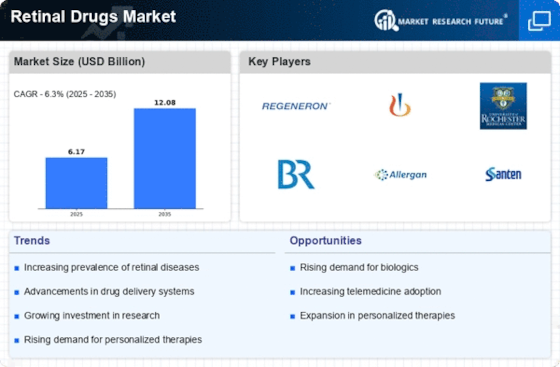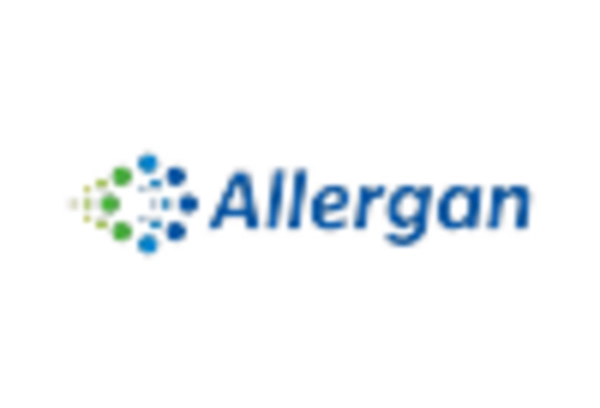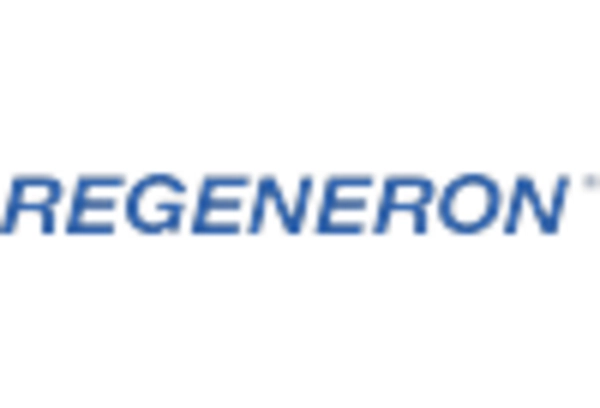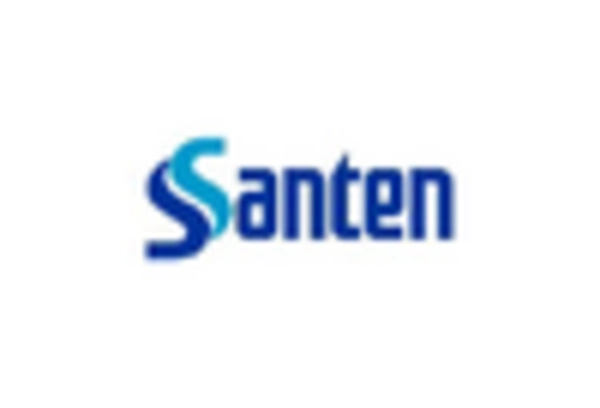Rising Prevalence of Retinal Disorders
The increasing incidence of retinal disorders, such as age-related macular degeneration and diabetic retinopathy, is a primary driver of the Retinal Drugs Market. According to recent estimates, the prevalence of diabetic retinopathy is projected to rise significantly, affecting millions worldwide. This surge in retinal disorders necessitates the development and availability of effective retinal drugs, thereby propelling market growth. As the population ages, the demand for innovative treatments is likely to escalate, leading to a robust market environment. The Retinal Drugs Market is expected to witness substantial investments in research and development, aimed at addressing these growing health concerns. Furthermore, the rising awareness among healthcare professionals and patients regarding retinal health is anticipated to contribute positively to market dynamics.
Regulatory Support for Innovative Therapies
Regulatory bodies are increasingly providing support for the development of innovative therapies within the Retinal Drugs Market. Initiatives aimed at expediting the approval process for breakthrough therapies are becoming more prevalent. This regulatory environment encourages pharmaceutical companies to invest in the development of novel retinal drugs, as the pathway to market entry appears more accessible. Additionally, the introduction of orphan drug designations for treatments targeting rare retinal disorders is likely to incentivize research in this area. As a result, the Retinal Drugs Market may witness a rise in the number of approved therapies, ultimately benefiting patients with limited treatment options. The proactive stance of regulatory agencies could significantly influence market dynamics in the coming years.
Growing Investment in Research and Development
The Retinal Drugs Market is experiencing a surge in investment directed towards research and development initiatives. Pharmaceutical companies are recognizing the unmet medical needs associated with retinal diseases, prompting increased funding for innovative drug development. In recent years, several companies have allocated substantial resources to explore novel therapeutic approaches, including gene therapy and biologics. This trend is expected to continue, as the potential for breakthrough treatments becomes more apparent. The financial commitment to R&D is likely to yield a pipeline of new retinal drugs, enhancing treatment options for patients. Furthermore, collaborations between academic institutions and industry players are fostering an environment conducive to innovation, thereby driving the growth of the Retinal Drugs Market.
Technological Advancements in Drug Development
Technological innovations in drug development are transforming the Retinal Drugs Market. The advent of advanced imaging techniques and high-throughput screening methods has enhanced the ability to identify potential drug candidates for retinal diseases. These technologies facilitate the rapid assessment of drug efficacy and safety, thereby expediting the development process. Moreover, the integration of artificial intelligence in drug discovery is likely to streamline the identification of novel therapeutic targets. As a result, pharmaceutical companies are increasingly investing in these technologies, which could lead to a surge in the availability of new retinal drugs. The Retinal Drugs Market stands to benefit from these advancements, as they may enable the introduction of more effective and targeted therapies for patients suffering from retinal disorders.
Increasing Awareness and Education on Eye Health
The growing emphasis on eye health awareness is a crucial driver of the Retinal Drugs Market. Public health campaigns and educational initiatives are fostering a better understanding of retinal disorders among patients and healthcare providers. This heightened awareness is likely to lead to earlier diagnosis and treatment of retinal diseases, thereby increasing the demand for retinal drugs. Furthermore, as patients become more informed about their treatment options, they may actively seek out therapies, contributing to market growth. The Retinal Drugs Market is expected to benefit from this trend, as healthcare systems prioritize eye health and allocate resources towards improving patient outcomes. The collaboration between healthcare professionals and patient advocacy groups is also anticipated to play a vital role in promoting awareness and education.


















Leave a Comment